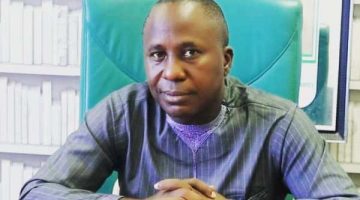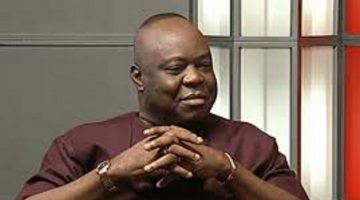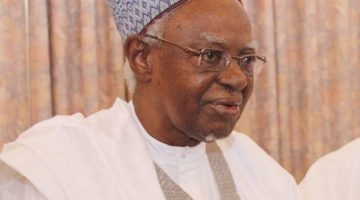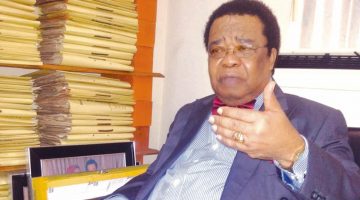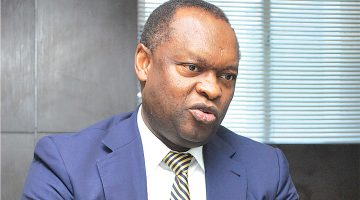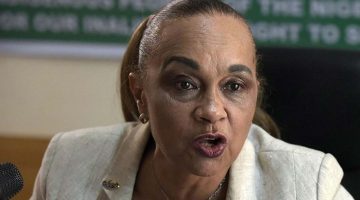Govt begins evaluation of experimental drugs
• Iwu presents possible bitter kola ‘cure’ to panel
• UN votes $50m to fight disease
SINCE August when government commissioned the Treatment Research Group on Ebola Virus, 15 cure claims for the disease have been sent to the panel, officials have said.
The Co-Chairman of the group, Prof. Innocent Ujah, told The Guardian on the sidelines of a press briefing in Abuja on Wednesday that Nigerian scientists and researchers had so far submitted 15 claims for Ebola cure. Many more, he said, were still being submitted and undergoing documentation by the group.
The drugs, he stressed, would undergo relevant scientific and laboratory analyses in line with international protocols.
Ujah, who is also the Director-General of the Nigerian Institute of Medical Research, spoke just as a member of the committee and the initiator of the bitter kola cure research, Prof. Maurice Iwu warned that Nigeria was still vulnerable to Ebola.
Ujah recalled that the group, commissioned on August 4, was saddled with the task of collating and analysing related research findings on the treatment of Ebola virus disease within Nigeria and around the world. The group, he added, also had the task of receiving and verifying claims relating to the treatment of Ebola virus disease.
Others, according to him, is to carry out research into the treatment of Ebola virus disease and to advise government as may be appropriate from time to time on findings and significance of such findings.
On what the group had done so far, he stressed: “What we have done was to review the literature or what is known about treatment or containment of Ebola virus disease. We did that and also reviewed the various experimental drugs that are available, including vaccines. We made these available to the minister of health for his perusal and necessary action. We will continue to look at what is happening in the world. As we all know, Nigeria is now being celebrated worldwide because of the aggressive, decisive and progressive approach, given the political will of government to the containment of Ebola virus disease in Nigeria.”
He paid special tributes to the heroes and heroines of the Ebola containment. He commended Dr Stella Adadevoh, including other doctors and nurses who died in the course of providing service.
“But for them, it would have been a national tragedy,” he noted.
He went on: “It is for the first time that we know that America should learn from Nigeria. It is a plus for Nigeria that we have been able to contain that. As we all know, it has spread to the U.S. and it has spread to Spain. But we realised the number of cases in Nigeria was 20. We lost eight. By any world standard, the case fatality rate is about 38.6 per cent, as against between 70 and 90 per cent that have been recorded.
“What it means is that if we are very proactive, which we are, we should be able to solve our problems. And, it is in this realisation that we thought there should be a follow-up: a follow-up to put experts together to discuss and brainstorm on the next level.”
Yesterday, the National Expert Committee on Ebola yesterday began evaluation of local and international experimental drugs for treatment of Ebola.
The experimental drugs include: Kolaviron from bitter kola, ZMapp from tobacco plants, Metallic Nano Particles, Nano Silver, Favipiravir, Lamivudine (Epivir), Brincidofovir, Choloroquine, Crofelemer and Dietary supplements such as Ganoderma, Immunovit, Immunocal, Ascorbic acid and Sodium Ascorbate.
For the first time, Iwu made a public presentation of his pioneer research on bitter kola (Garcinia kola) ‘cure’ for EVD and announced plans to continue with the research.
Iwu said his parent company, Bioresources Institute of Nigeria (BION), on September 5, 2014, signed a cooperative research agreement with the United States National Institute of Allergy and Infectious Diseases (NIAD) for the evaluation of compounds submitted by BION for activity against Ebola.
He said the agreement covered pre-clinical and non-clinical tests.
Iwu said the proposed project to continue the research into bitter kola ‘cure’ for EVD would consist of three related components: Standardised whole seed of Garcinia kola (currently available as Garcinia – IHP with National Agency for Food, Drug Administration and Control (NAFDAC) Registration No. A7- 1328L; Kolaviron – GMP production of kolaviron for quality evaluation and bioactivity assays using procedure previously described; and Preparative Isolation of Garcinia biflavonoids: scaled-up isolation of GB-1 & GB-2 sufficient for undermentioned biological investigations by InterCEDD Laboratories Nsukka.
The professor of pharmacy said the scope of work to be undertaken would include pre-clinical bioavailability studies and the determination of the most appropriate mode and route of administration, efficacy studies in non-human primates, human safety determination in a phase-one clinical trial, and limited clinical outcome evaluation if approved by relevant clinical committees and agencies.
The meeting of the committee and public presentation and evaluation of experimental drugs for EVD was attended by researchers including the Director-General, National Institute for Pharmaceutical Research and Development (NIPRID), Abuja, Prof. Karniyus Gamanie, and the Director-General of the Nigerian Institute for Medical Research (NIMR), Yaba, Lagos, Prof. Innocent Ujah.
In his presentation titled: “Garcinia kola (Bitter kola) Seeds, Kolaviron and GB-1 as Possible Post-Exposure Agents in the Management of Ebola Virus Disease,” Iwu proposed that bitter kola could ameliorate the virus-induced suppression of cellular immunity during Ebola virus infection because of its inhibitory effects which involve modulation of multiple signalling of several pro-inflammation pathways/ targets.
According to him, the Kolaviron isolated from bitter kola has been shown to interfere with and reduce the activation of several inflammatory transcription factors and Garcinia biflavonoids also possess strong antioxidant activity which may be useful in protecting the infected cells from the reactive oxygen (ROS)-mediated neuronal cell death associated with Ebola virus infection.
To Iwu, there is abundance of literature on the role of oxidative stress in the pathogenesis of viral infections.
The pharmacist explained: “Garcinia biflavonoids, Kolaviron belong to a large family of compounds called flavonoids. Flavonoids are interesting compounds that are wide-spread in plants as products of their secondary metabolism and are regularly ingested in small quantities from many edible plants.”
Iwu said a propriety product, Garcinia – IHP, which had been registered with NAFDAC with Registration No. A7-1328L had been in pharmacies since 2012.
He explained: “Kolaviron and its constituents are unique among flavonoids in that their sub-group, Garcinia biflavonoids (dimeric Eriodictyol) are restricted only to the plant genus Garcinia, and the principal compounds GB-1, GB-2 and kolaflavanone have been found to occur only in the bitter kola, Garcinia kola.”
Meanwhile, sensing imminent spread of Ebola, the United Nations Food and Agriculture Organisation (FAO) is launching a programme that will assist 90,000 vulnerable households in Guinea, Liberia and Sierra Leone, just as Secretary-General, Ban Ki-moon separately announced the appointment of United Nations Crisis Managers in the three countries hardest hit by the Ebola outbreak in West Africa.
The global body’s Fifth Committee which is normally in charge of administrative and budgetary functions has now approved a near $50 million package ($49.9 million) for the UN Ebola Response Mission and is currently reviewing Assessment Scale to Calculate Financial Contributions of Member States.
The new incentive for the push for a stronger global response to Ebola is coming just as the Texas Ebola patient Thomas Eric Duncan, a Liberian national and the first patient diagnosed outside of Africa, died at a Dallas hospital where he was being treated.
“Our comprehensive response is part of overall United Nations efforts to save lives and protect livelihoods,” said Vincent Martin, head of the FAO’s office coordinating the response for the countries, whose food supply and livelihoods are threatened by the disruptive effect of the Ebola epidemic on rural economies, agricultural activities and markets.
Nigeria is the fourth West African nation known to have had the Ebola crisis. But the country is now receiving commendations even from officials at the UN headquarters over the way the country’s authorities rose to the occasion.


